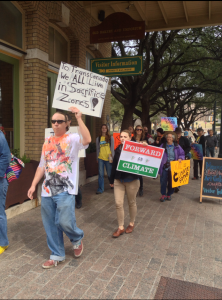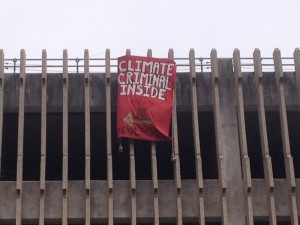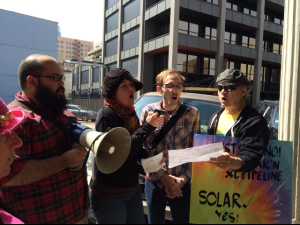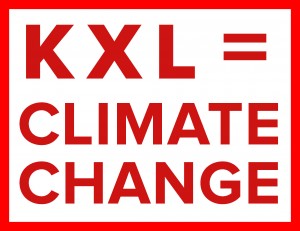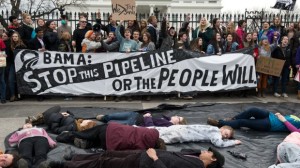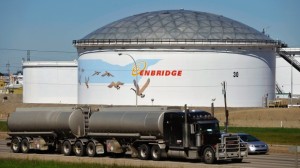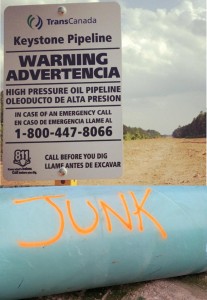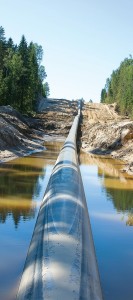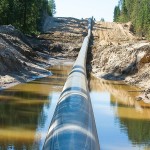UPDATE: If you didn’t catch the CBS national news report on Tuesday, November 12th on the problems with the Southern Segment of Keystone XL, click here.
Public Citizen Calls for Congressional Oversight Hearings and Delay in Startup
As the Obama administration considers whether to approve the Keystone XL pipeline’s northern segment, owner TransCanada faces serious questions concerning construction and pipeline integrity issues on the Texas portion of the pipeline that throw its safety into question, Public Citizen said today.
In light of the problems – documented in Public Citizen’s newly released report, “TransCanada’s Keystone XL Southern Segment: Construction Problems Raise Questions About the Integrity of the Pipeline” – citizens and elected officials should call for a delay in startup until an investigation into its safety is completed.
The report documents construction problems and apparent engineering code violations along the Texas portion of the southern segment of the pipeline. The full southern segment, scheduled to be filled with oil by the end of 2013, will run from Cushing, Okla., to refineries on the Gulf Coast of Texas. It traverses 631 streams and rivers in Texas alone (see http://texaspipelinewatch.files.wordpress.com/2013/09/watersheds.pdf).
The apparent problems documented in the report include pipe being installed as part of new construction that had excessive bending or sagging, and peeling patches of field coating applied to cover damage on pipe about to be placed into the ground.
The report also notes more than 125 excavations in 250 miles of possible “anomalies” on pipe that had been buried for months. Those anomalies included dents, sags and other problems that could lead to spills or leakage of toxic tar sands crude.
“The government should investigate, and shouldn’t let crude flow until that is done,” said Tom “Smitty” Smith, director of Public Citizen’s Texas office. “Given the stakes – the potential for a catastrophic spill of hazardous crude along a pipeline that traverses hundreds of streams and rivers and comes within a few miles of some towns and cities – it would be irresponsible to allow the pipeline to start operating.”
Public Citizen also urges President Barack Obama and Secretary of State John Kerry, when deciding on the northern leg of Keystone XL, to consider TransCanada’s record of construction problems and code violations, and the pipeline’s potential impact on the sensitive areas of the Ogallala aquifer, which provides drinking water for millions of people, and the Sand Hills region of Nebraska, which the pipeline route crosses.
The report, available at http://www.citizen.org/documents/Keystone report – November 2013.pdf, encapsulates information gathered by Public Citizen, whose consultant traveled the area from May through June. Public Citizen collaborated with former TransCanada engineer and whistleblower Evan Vokes, who worked for TransCanada from 2007 to 2012 in the division responsible for construction standards.
For the report, landowners were interviewed, excavation sites were observed, video was reviewed and hundreds of photos of damaged pipe and work sites were examined. Observers also flew over the pipeline route several times.
In some areas, observers noticed stakes marked with “anomalies,” placed by TransCanada, with companion stakes marked “welds” and “dents.” One landowner reported that TransCanada contractors said as many as 70 anomalies were found in a 60-mile stretch between the Sulphur and the Sabine rivers in Texas.
TransCanada has claimed that the excavation and replacement of new pipe demonstrates its commitment to implement 57 special conditions of quality assurance and to build a “state-of-the-art” pipeline.However, TransCanada has had a history of problems with pipeline construction and safety for two decades:
- During the construction of Keystone I, TransCanada pledged to meet 50 special conditions. But more than 47 anomalies along the line in four states had to be retested, and the Keystone I line spilled 12 times in the first year of operation.
- In July 2011, TransCanada’s Bison natural gas pipeline exploded within the first six months of operation, blowing out an approximate 40-foot section of pipe. TransCanada had been warned of potential quality problems with construction and inspection.
- In the 1990s, Iroquois Pipeline Operations, a subsidiary of TransCanada Pipelines Ltd., and four senior executives pleaded guilty to knowingly violating environmental and safety provisions of the pipeline construction permit. Iroquois executives had promised a pipeline of exceptional safety.
Public Citizen is calling on the Pipeline and Hazardous Material Safety Administration (PHMSA) to review TransCanada’s construction quality assurance records, determine whether state and federal laws have been violated, and not permit the start of operations on the southern leg of the Keystone XL until the entire line has been hydrostatically retested – a sophisticated process that sends water through a pipeline at a specified level of pressure higher than the maximum operating pressure to test the integrity and strength of a pipeline. The southern segment also should be tested by an inline caliper device called a smart pig to look for integrity problems.
Public Citizen also calls on Congress to hold oversight hearings to ensure that PHMSA investigates and addresses the safety of the pipeline.
“TransCanada’s history with pipeline problems speaks for itself,” Smith said. “I fear we could be looking at another pipeline whose integrity may be in question.”
Citizens can:
- Call upon Congress to hold oversight hearings to assure that the pipeline is retested and its safety is ensured;
- Attend one of seven upcoming citizen hearings on the safety of the pipeline in East Texas (see http://texaspipelinewatch.org/calendar/ for schedule and addresses);
- Meet with local first responders and ask county governments to develop tar-sands-spill- emergency response plan; and
- Ask legislators to reform Texas common carrier laws pipeline and pipeline safety standards.
For video of pipeline issues, see http://nacstop.org/EastTexasObserver.html.
June 16, 2013 tape
- sagging, 4.38-4.59 minutes;
- coating problem, 5.25-6.12 minutes;
- anomaly mark, 6.24-7.10 minutes.
See May 31, 2013 tape
- sagging, 26-31 seconds;
- water, 4.59 minute
- unsupported pipe, 4.29-6.20 minutes
Read Full Post »
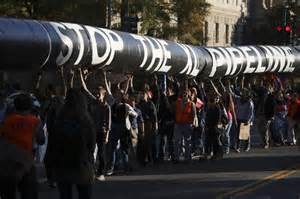 According to a press release by NRDC and Oil Change International, new data released by the U.S. Energy Information Administration (EIA) proves that, as President Obama has emphasized in recent comments, the proposed Keystone XL tar sands pipeline would serve primarily as an export pipeline, bringing dirty Canadian tar sands crude to the international market.
According to a press release by NRDC and Oil Change International, new data released by the U.S. Energy Information Administration (EIA) proves that, as President Obama has emphasized in recent comments, the proposed Keystone XL tar sands pipeline would serve primarily as an export pipeline, bringing dirty Canadian tar sands crude to the international market.